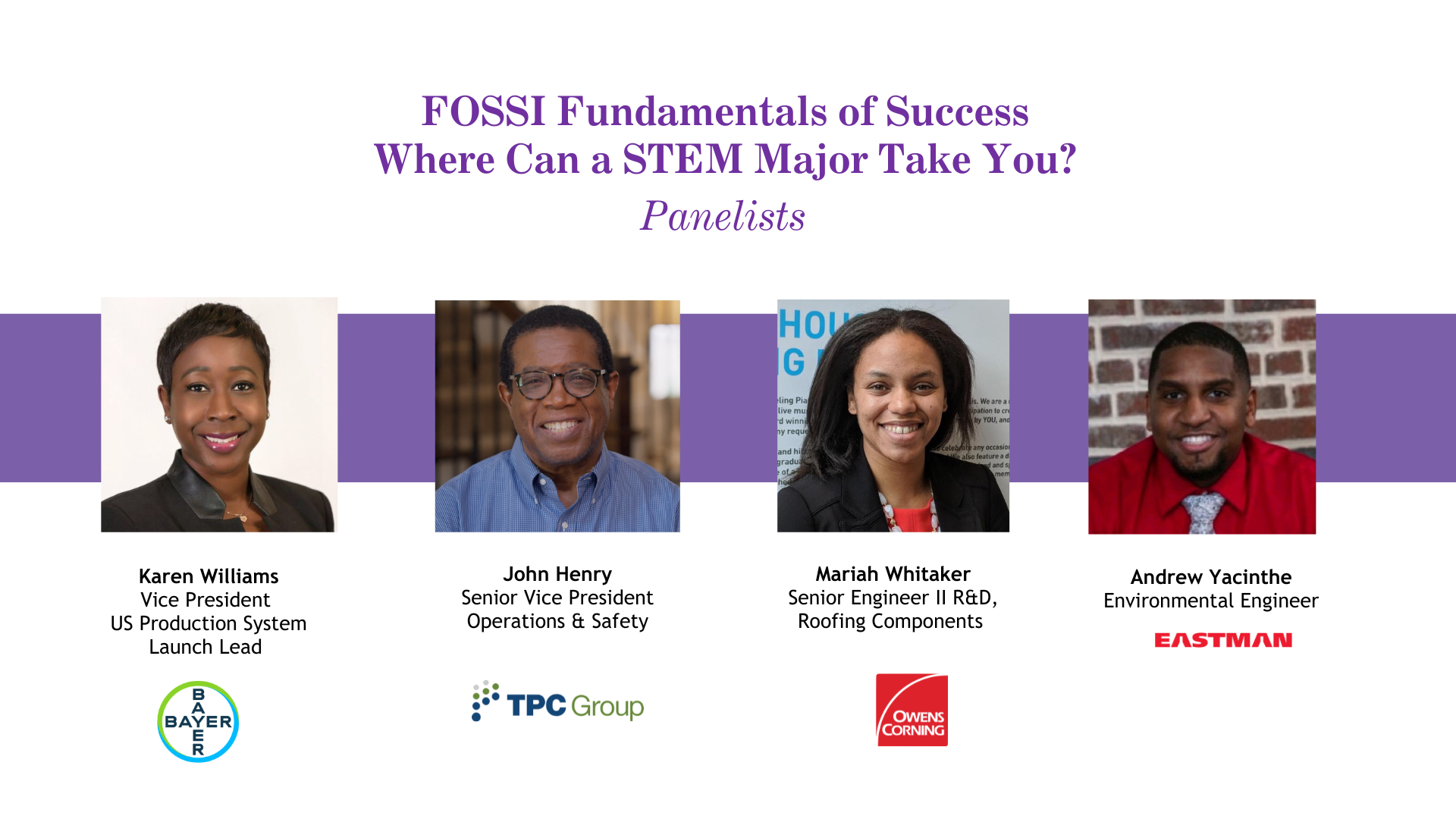
In the latest discussion on STEM careers, FOSSI partners from Bayer, Owens Corning, TPC Group, and Eastman shared with scholars why they love what they do, their path to success, and lessons learned along the way.
A Typical Day
Andrew Yacinthe, Environmental Engineer, Eastman: has a degree in environmental and ecological engineering. He has been with Eastman for nine years in environmental engineering roles and did a stint in legal compliance. He currently provides environmental support in manufacturing.
On a typical day, “The first thing I do is check calls and emails,” he says. “Eastman is a 24/7 operation, so we have a daily production meeting to review what happened overnight and the big-ticket items for the day. If there is anything out of the ordinary, I make sure all our operators know what to watch and what to expect. Safety is a core value, and if everyone knows what’s going on, they can take the best measures to ensure their safety. We also want to be good stewards of the environment, so I check the data to make sure it is valid and we are staying within compliance. If I see an issue, I’ll talk to the operators to get their perspective and find out what’s going on.”
Mariah Whitaker, PhD, Senior Engineer II R&D - Performance Materials & Product Development Lead, Roofing Components, Owens Corning: has a BS in chemistry and PhD in chemical engineering. Five years ago, she joined Owen Corning’s Science and Technology Leadership Program and completed one-year projects in different functions to get an overview of the company. She currently serves as product development lead in the roofing components business.
Like Andrew, the first thing Mariah does in the morning is answer emails. She also participates in meetings with her product managers and R&D teams to discuss product execution and technical work. “If I have time, I go to the lab to work on concepts that are related to tech development projects. I also do research by reading academic papers, particularly in the area of patents to make sure any new products are protected.”
Karen Williams, Vice President, US Production System Launch Lead, Bayer: has a B.S. and master’s degree in chemical engineering. She has been with Bayer for 18 years in nine different roles. “It’s been a great ride” she says. “I started at a plant in manufacturing and from there I took on leadership roles with increasing responsibility. I’ve always made sure that with each new role, I am learning and pushing myself out of my comfort zone.” Currently, Bayer is upgrading its SAP system of record, and Karen is leading the launch in the U.S. for their production area.
“Every day is different, which is why I love my job” she comments. I work with global colleagues and technical experts. I also spend a lot of time in meetings. Early in your career, you spend a lot of time in a plant, but as you grow your career, much time is spent in meetings – planning, making decisions, setting direction for the team and project, and assessing progress. It is my job to ensure that we are getting everything done that we need to get done so we are successful.”
John Harvey, Senior Vice President, Operations & Safety, TPC Group: has been in the petrochemical industry for 40 years. He has site management experience in Ohio, Texas, South Carolina, Georgia, and Washington State. He also supported building plants in Mississippi and Indonesia and has spent time in Asia.
At TPC Group, four chemical plants report to him 24/7, so for him, the day never ends. “The biggest thing is safety and making sure what we are doing is environmentally friendly,” he comments. “Second are the production aspects—how people are doing and making sure the operation is efficient and productive.”
STEM leaders reflect on pivotal moments and lessons learned
After the initial remarks, each panelist answered a unique question from Adrienne Blanks.
What don’t people know about your career path?
John Harvey: “You never know where life will lead you. I thought I wanted to go to med school but gravitated towards research and manufacturing. I thought it was much cooler to make things that make people’s lives better. Someone thought I had an aptitude for mechanical engineering and I became an assistant plant manager and never looked back.”
What do you like best about your job?
Mariah Whitaker: “Being in R&D, I get to work on really innovative solutions that solve problems our customers are experiencing. I ’ve been a part of the pilot, the scale-up, and the launch of a product. It’s exciting to see the technology develop from the small bench level to the big scale at the plant.”
How did you figure out what you were meant to do?
Andrew Yacinthe: “I knew I wanted to be an engineer in 4th grade. I was good at science and math and really interested in aerospace. My freshman year, NASA lost a lot of their funding, so I pivoted to environmental engineering. I figured if I couldn’t go to space, then I could stay on earth and help save it.”
What would you tell you 17-year old self?
Karen Williams: “Take the opportunity even if you’re not 100 percent confident or you don’t feel like you have the skills or the experience to do it. Even if it doesn’t go as you expected, the experience can be invaluable. And that goes for everything in life, not just work. Great things never came from comfort zones. FOSSI is an incredible opportunity, and I urge you to take full advantage of everything that comes with it.”
If you’re a company interested in supporting outstanding, diverse STEM talent, learn how you can become a FOSSI sponsor and make a lasting impact.